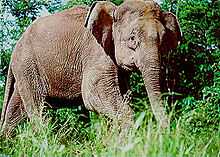Pygmy elephant

So-called pygmy elephants live in both Africa[1] and Asia.[2][3][4] The African pygmy elephant, formerly described as "Loxodonta pumilio", is currently considered to be a tiny morph of the African forest elephant (L. cyclotis).[1]
The Borneo elephant (Elephas maximus borneensis), a well-documented variety of elephant, is also called "pygmy elephant." This elephant, inhabiting tropical rainforest in north Borneo (east Sabah and extreme north Kalimantan), was long thought to be identical to the Asian elephant and descended from a captive population. In 2003, DNA comparison revealed them to be probably a new subspecies.[2][3][4]
The term pygmy elephant should not be confused with "dwarf elephant", which is used for a number of extinct species of elephants that evolved their size due to island dwarfing.
References
- ↑ 1.0 1.1 Debruyne R, Van Holt A, Barriel V, Tassy P (July 2003). "Status of the so-called African pygmy elephant (Loxodonta pumilio (NOACK 1906)): phylogeny of cytochrome b and mitochondrial control region sequences". C. R. Biol. 326 (7): 687–97. doi:10.1016/S1631-0691(03)00158-6. PMID 14556388.
- ↑ 2.0 2.1 Fernando P, Vidya TNC, Payne J, Stuewe M, Davison G et al. (2003). "DNA Analysis Indicates That Asian Elephants Are Native to Borneo and Are Therefore a High Priority for Conservation". PLoS Biol 1 (1): e6. doi:10.1371/journal.pbio.0000006. PMC 176546. PMID 12929206.
- ↑ 3.0 3.1 CBS News. July 1, 2005 Spying on the Pygmy Elephant
- ↑ 4.0 4.1 Alfred, R., Ahmad, A.H., Payne, J., William, C., Ambu, L., 2010; Density and population estimation of the Bornean elephants (Elephas maximus borneensis) in Sabah. |journal=Online Journal of Biological Sciences |volume=10 |issue=2 |pages=92-102
- Groves, P., Grubb, P. (2000). "Are there Pygmy Elephants?" (PFD). Elephant 2 (4): 8–10.